0030 So, is this really about [wealth and power]?
For an author that self-identifies… er… is selflessly identified as a Hegelian philosopher, a Lacanian psychoanalyst and a Marxist materialist, the uninitiated has a simple question, “Why not just grasp the bronze serpent of pure atheism and be done with it?”
Well, I suppose that the bronze serpent is a little too nonscientific to intellectually accept.
Even though it keeps us alive.
After all, plagues can be unnerving.
So, let me tone down the dragonian imagery and replace the Freudian ‘death drive’1c with the less draconian term, ‘our truth’1c. Of course, in the following figure, the “our” is already fading, because, well, the Relativist One3 stands above all jurisdictions, including whatever dominion lays claim to me.
Here is the adjusted picture, where the Relativist One3 stands as the alternative to Zizek’s Christ3.
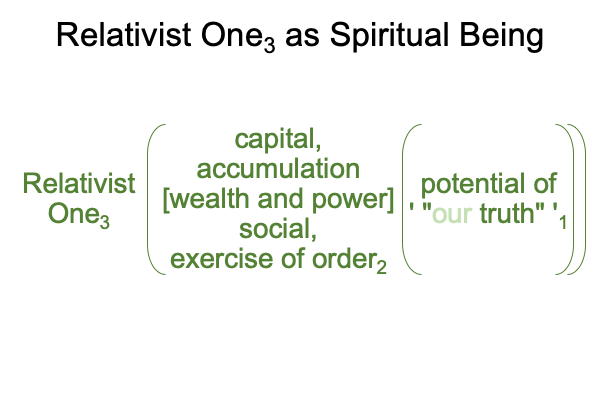
0031 Isn’t that more palatable?
However, I have not addressed the question, asking, ” Why does Zizek find Christian atheism attractive?”
Why Christ3?
One answer is that Christianity is not direct. It is the only religion that cannot be accessed directly. To get to the New Testament, one must pass through the Old Testament. The passage is perilous, because Judaism is like a tar baby. Once you touch it, you are stuck with it. And, if you dare to shake the tar baby off, your are left with an indelible stain. Today, that stain is called “antisemitism”.
Of all “-isms”, antisemitism is unique because it occupies the passage to Jesus, the Messiah. Jesus is Christ because the elites of the second Temple do not want any competitors. So what does the Messiah do? He turns their establishment into a doormat.
0032 The execution of Jesus is a routine political operation.
The Roman occupiers are intent on preventing the appearance of a king that would unite all Jews with the Second Temple. In this regard, they are like socialists. Socialists are in the business of exercising order. Rome rules an empire. Order is paramount.
The Sadducees and Pharisees are intent on maintaining their authority, in regards to their “readings” of the Pentateuch. They distill laws from the text. The laws multiply, like all regulations do. The elites earn nice incomes from determining laws and devising pathways to evade the laws that they determined. They are the bourgeois who represent God… er, the Text… to the proletarians. In this respect, the elites of the Second Temple are like capitalists.
0033 The operation?
The capitalist offers a crisis for the socialists to fixate on, and, in the process, remove a potential roadblock to the status quo of continuing acquisition.
Here, the Second Temple elites offer a “king”, actually, a potential competitor who might undermine their um… “business practices”, for the Romans to worry about, arrest and execute.
0034 In Hegel’s terminology, the capitalists offer a thesis, that produces a socialist antithesis, inadvertently advancing the agenda of the capitalist, while, at the same time, generating an objective being, a “truth”, if one accepts the term, that is accessible to all who pay attention.
0035 Above the crown of the dying Jesus, the Romans post a sign, proclaiming, “King of the Jews”.
Below the feet of the dying Jesus, attending elites mutter about how incorrect that proclamation is. The declaration should say, “He claims that he is King of the Jews.”
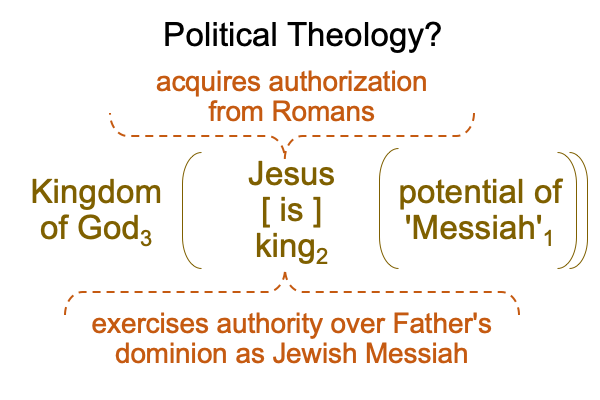
0036 Both are political accusations. They parallel one another. Jesus is actual king2 by way of Roman authority. Jesus purports to establish his kingdom as a normal context3 upon the potential of his rule being not of this world1.
Then, wait three days, the divine consequences shake the capital. The political parallels appear to converge on a single point, a single “substance”. Jesus is dead and now… um… lives to tell about it. An ontological reality coincides with a transcendent reality. Jesus [is] king2b and his kingdom3b manifests the potential of the Messiah1b.
I [am] who I am crowns His Son as king of a sovereignty that is both of and not of this world.
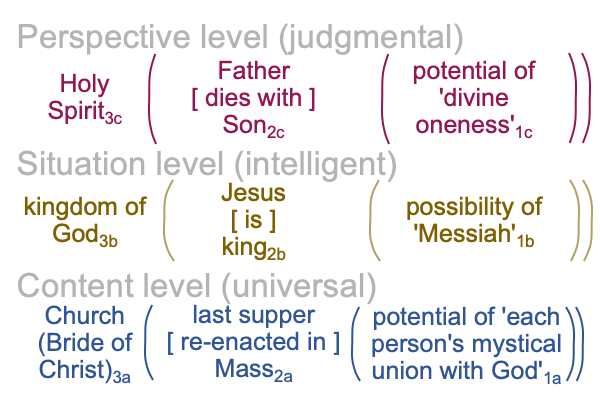
0037 To the Hegelian, the capitalist, who is concerned about accumulating offers a thesis that taunts the socialist, who is concerned about the exercise of order.
That thesis keys into [wealth and power].
The socialist responds to the capitalist’s thesis with an antithesis, inadvertently advancing the agenda of the capitalist, while at the same time generating a “suprasubjective being”, a “truth”, if one accepts the term, that is experienced as a revelation.
0038 By 70 AD, the congruence of the two systems that executed Jesus ends. The Romans destroy Jerusalem and level the second Temple, in a military act whimsically called, “Operation Gaza”.
0039 Christianity may overcome the gap that separates humans from God. But, that is not the issue at hand. For the purposes of this examination, Christ3 provides a way to step on the doormats of capitalism and socialism, or the accumulation of capital and the social exercise of order, on the way to… what?.. understanding ‘truth’1?
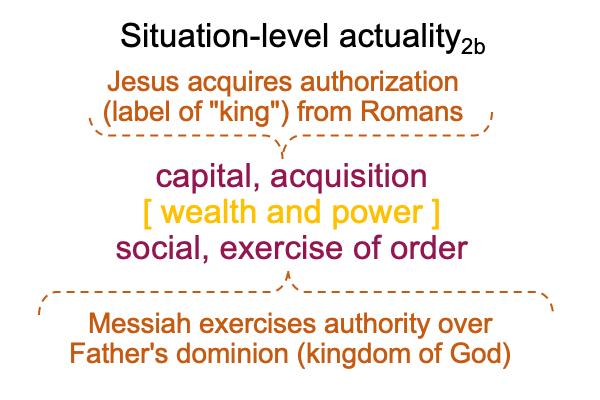
0040 Both capital and social are doormats. In Lacan’s terms, instances of desire, or mental organization, or fixation, or whatever the French term, objet a, indicates, are like doormats, that is actualities2 that must be stepped upon in order to contextualize3 the potential of truth1.
Also, the contiguity, [wealth and power], which everyone can talk about even though they cannot picture or point to what it is that they are talking about, may be labeled petit objet a.
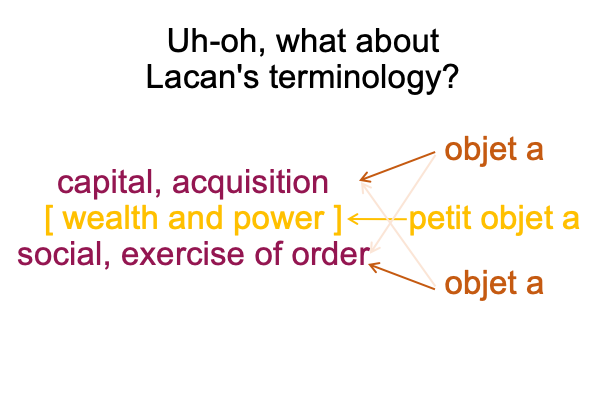
0041 A petit objet a serves as a clue that an objet a is present, even though it is too close or too far, too enveloping or too miniscule, to recognize. This makes sense, here, insofar as objet a is both matter and form. Plus, matter and formbelong to the first abstraction in a natural philosophy of the thing itself.
If capital & accumulation (thesis) explains whatever demands the exercise of social interests & order (antithesis), then where is the synthesis?
0042 Let me make a comparison of Aristotle’s hylomorphe and this perspective-level economic thing2c.
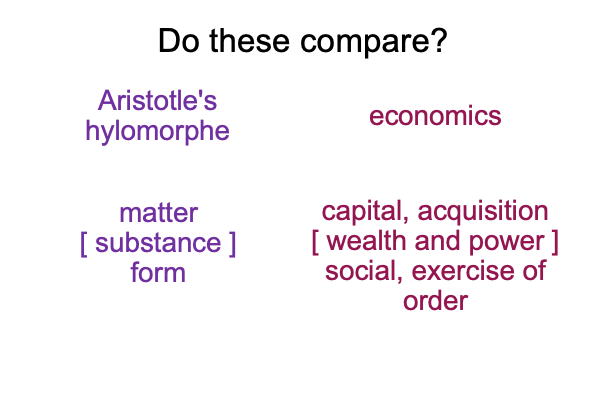
0043 Every term in the above figure is an explicit abstraction.
0044 What do I mean by that?
Spoken words can label everything and anything, wholes and parts, big and small, whatever. In this sense, a spoken word precedes its referent. The label precedes the thing that is labeled.
0045 In contrast, the manual-brachial gestures of hand talk picture and point to their referents. Referents precede the gestural word. This is why humans innately imagine that, when hearing a spoken word, that the referent can be pictured or pointed to.
This lesson even applies to some rather odd hand-talk names.
Consider the paleolithic artifact that combines two hand-talk works, [image LION] and [image MAN]. When my compatriot gestures [LION][MAN], I know that the referent is both lion and human. The referent either has the matter of a lion and the form of a man or the matter of a man and the form of a lion. Or, the referent is a mixture of these two arrangements.
This is an implicit abstraction.
0046 Aristotle and Peirce agree that speech-alone talk confounds our intuition because we expect that every word has a referent that is so whole as to be pictured or pointed to. That is why hylomorphes shine. They substitute for what would be [image MATTER][image FORM], if matter [and] form could be pictured using manual-brachial word-gestures.
The same goes for what [point to CAPITAL & ACQUISITION][point to SOCIAL & EXERCISE OF ORDER] would be,if these spoken terms could be pictured or pointed to. But, even though hylomorphes shine in this regard, the explicit abstraction inherent in spoken words confuses our intuition.
0047 A good rendition of a [LION][MAN] appears in the 1930s movie, The Wizard of Oz. This is the movie where Dorothy’s silver shoes (in the book) are replaced by ruby slippers (in the movie), shifting what grounds Dorothy from the honesty of a precious metal to the deviousness of fiat currencies. Red is the color of both bankruptcy and blood.
But, back to the movie, at the happy end of the yellow-brick road, in the Emerald City, the lion man, who would be courageous if he only was not a scaredy cat, receives a medal of honor and thereby assumes (through acquisition, thesis) a heroic place in the social order (antithesis).
If the following figure fits the above comparison, then what does that imply about the substance, [wealth and power]?
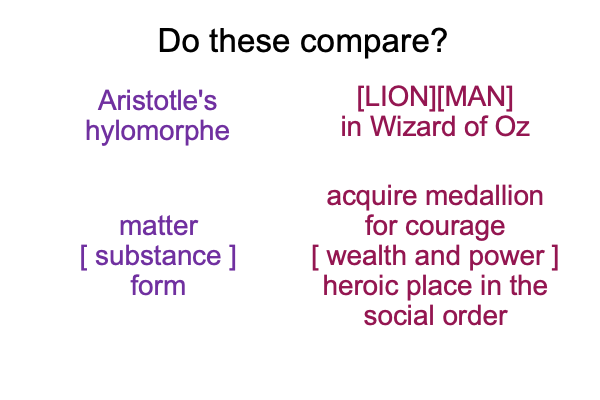
0048 Am I saying that every citizen has “skin in the game”?
If citizens hold the liberty to acquire property and build capital, then will those citizens order themselves, as a spontaneous social exercise, through the [substance] of [wealth and power]?
Hmmm. Does “capitalist substantiated spontaneous socialism” sound like Zizek’s “emancipatory collective”?
